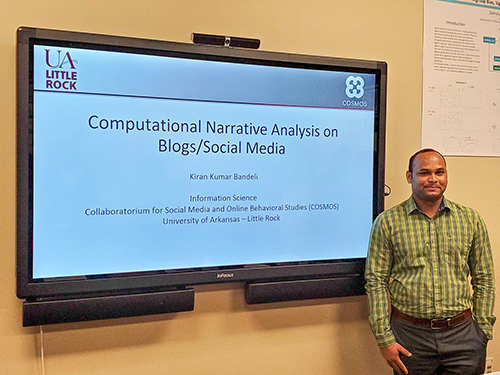
Kiran Kumar Bandeli successfully defended his doctoral dissertation “A Framework Toward Computational Narrative Analysis on Blogs/Social Media” Monday, November 25, 2019. In attendance were committee members Dr. Nitin Agarwal (chair), Dr. Elizabeth Pierce, Dr. John Talburt, and Dr. Ningning Wu as well as members of COSMOS.
During his time at COSMOS, Kiran quickly familiarize himself with blogs.
“Blogs in particular act as virtual spaces where narratives are framed. It is therefore important to study and understand the way information is said by the actors on social media platforms,” Kiran explained.
Narratives are organized, long-lasting themes and ideas that persist in discourses. It is challenging to extract narratives from social media, and even more so to interpret them. However, developing a more effective way to study these narratives carries great implications, paving the way for strategic communication on social media, impacting discourse and disinformation and in turn being able to counter those false narratives and avoid damaging society.
The main obstacle has been finding an improved way to evaluate online narratives. Traditionally, this has been done manually, which is arduous and time-consuming. Being able to do this process computationally would save resources and allow for data collection on a broader scale. Kiran’s research addressed the computational identification of narratives, detection of dominant and less-dominant narratives, creation of topic steams to identify narratives and the validation of such computational approach. He uses a multi-method, entity-based approach that includes topic modeling, and NLP-POS tagging, chunking and TF-IDF methods to not only identify narratives, but also determine which ones are dominant and less-dominant. Additionally, he explored topic streams path to see what narratives can be identified.
Since he joined COSMOS in the summer of 2017, Kiran has co-authored more than ten papers that include research on disinformation activities on blogs, challenges and opportunities in blog data collection, analyzing shift in narratives, strategic integration of social media platforms in disinformation campaign coordination, and socio-computational analysis of YouTube videos. Kiran’s work was recently published in NATO Strategic Communications Center of Excellence (StratCom COE) and Journal of NATO Defence Strategic Communications.
